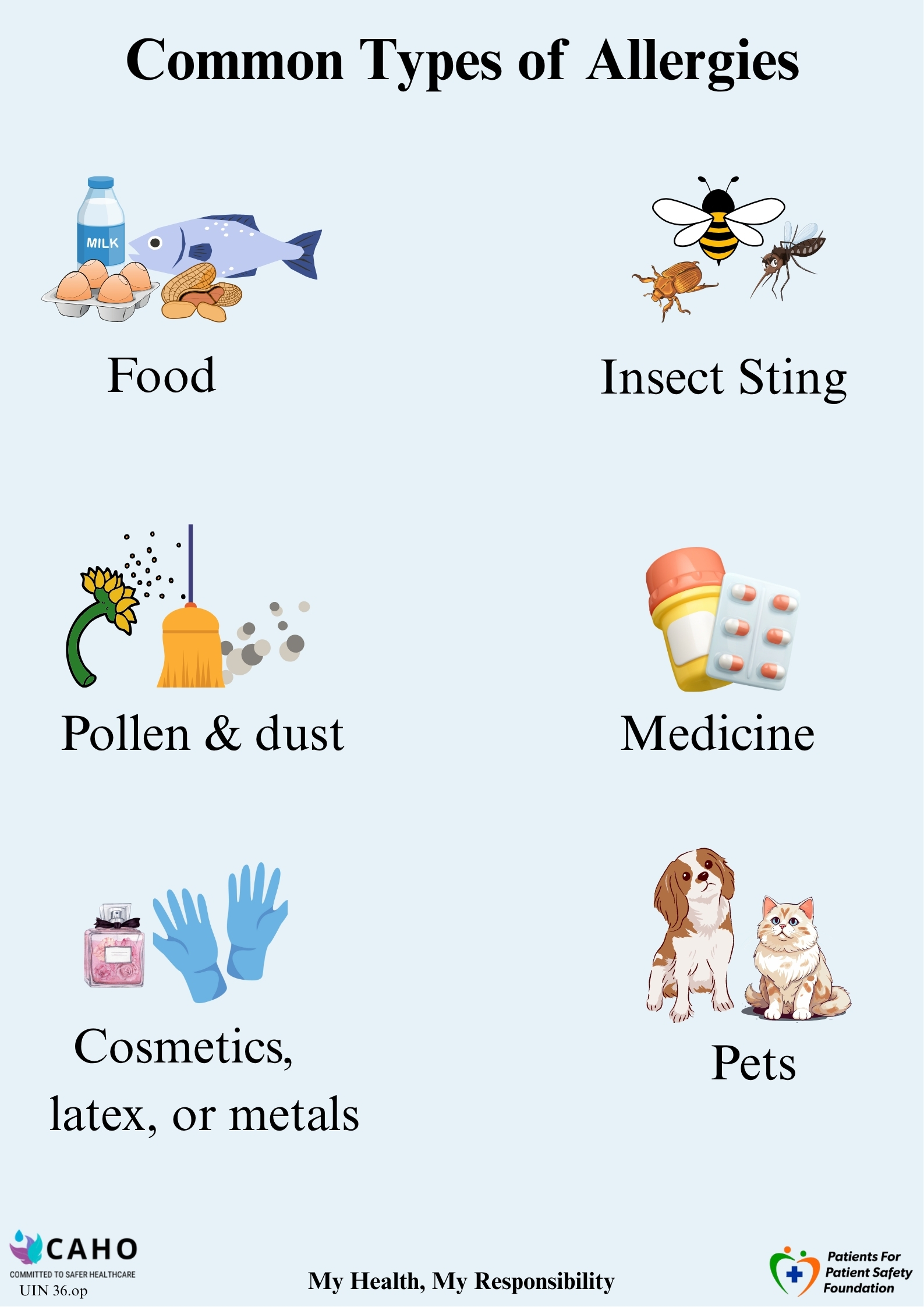Allergies Could Strike Without
Warning – Be Alert
Allergies are a common health concern, affecting millions worldwide. They
occur when your immune system mistakenly identifies a typically harmless
substance as a threat. This overreaction can lead to a range of symptoms, from
mild discomfort to life-threatening emergencies.
Types of Common Allergies:
Allergies are triggered by what are called allergens. Most of these allergens are
always around us, but some people have an allergic reaction to any of them.
- Food allergies occur when the immune system reacts to specific proteins
in food. Common food allergens include milk, eggs, peanuts, tree nuts
(almonds, walnuts), fish, shellfish, wheat, soybeans, and sesame.
- Respiratory allergies. Triggered by airborne particles that are inhaled.
- Seasonal allergies: Primarily caused by pollen from trees, grasses, and
weeds, occurring during specific times of the year. Others are dust mites,
mould spores
- Insect sting allergies: Severe reactions to the venom of stinging insects
like bees, wasps, hornets, and fire ants.
- Drug allergies: An immune response to a particular medication, such as
penicillin or other antibiotics.
- Skin allergies: Occur when the skin comes into contact with specific
substances, such as metals in jewellery, latex or fragrances.

How do you identify an allergy?
Watch out for common symptoms, which suddenly come, such as:
Runny nose, sneezing, watery red eyes, rashes, nausea, stomach pain(especially
with food allergies), wheezing, difficulty breathing and swollen face, lips.
Some allergies raise the risk of more serious health conditions, including:
- Anaphylaxis. Some foods, medicines, latex and insect stings are the most
common triggers of anaphylaxis. This can lead to a serious medical
emergency requiring hospitalisation.
- Asthma is a common immune system reaction that affects the airways
and breathing and is triggered by exposure to an allergen in the
environment.
- Infections of the sinuses, ears or lungs. Your risk is higher if you have
hay fever or asthma.
Who is at Risk?
Anyone can develop allergies in childhood or later in life, and Several factors
increase the likelihood of this happening.
- Having a family history of asthma or allergies,
- Allergies are particularly common in children, many of whom may
experience symptoms during early childhood.
- People living in urban areas have higher exposure to allergens
Some allergies are early to determine while many others may need process of
elimination.
How to Diagnose:
Your healthcare provider will ask about your medical history, symptoms, their
timing, and any potential triggers, and based on your history, the allergist will
select the most appropriate tests.
Common tests include:
- Blood Test (IgE Antibody Test or RAST test)
- Skin Prick Test: Small drops of watery solutions containing various
allergens are placed on the skin, and the skin is lightly pricked. If you're
allergic, a small red, itchy bump will appear at the site within 15-20
minutes.
- Oral Food Challenge: Under strict medical supervision, increasing
amounts of a suspected food allergen are given to the patient to observe
for a reaction.
How is it treated?
Allergy treatment usually includes over-the-counter or prescription medications,
such as Antihistamines, decongestants, etc and nasal sprays.
Several allergies can be life-threatening and require prompt treatment followed
by emergency medical care. If your allergy is identified, then the doctor will
prescribe specific SOS medicines to keep and self-administer.
How Can I Prevent Allergic Reactions?
The most effective way to prevent allergies is to minimise exposure to allergens
to which you are susceptible. This involves identifying your triggers and taking
proactive steps to avoid them.
- Carefully read food labels. Be vigilant when eating out.
- Let people around you, including friends and restaurant staff, know about
your allergies.
- Avoid direct contact, such as petting, hugging, or kissing animals, if you
are allergic to pets. Always wash your hands after petting animals.
- Regularly clean and vacuum carpets, rugs, and upholstered furniture to
eliminate dust, pollen, and pet dander.
- Avoid outdoor activities when pollen counts are high. Wearing a mask
and sunglasses can also help minimise exposure.
- Take prescribed allergy medications as directed, even before symptoms
start, if advised by your doctor. Keep SOS medicines handy.
- Medical Alert: In some cases, wearing a medical alert bracelet or
necklace that clearly states your severe allergies.
The physician may also advise additional treatments like immunotherapy
Allergies impact the quality of life, but by knowing their causes and being
cautious, one can prevent and manged them well.

